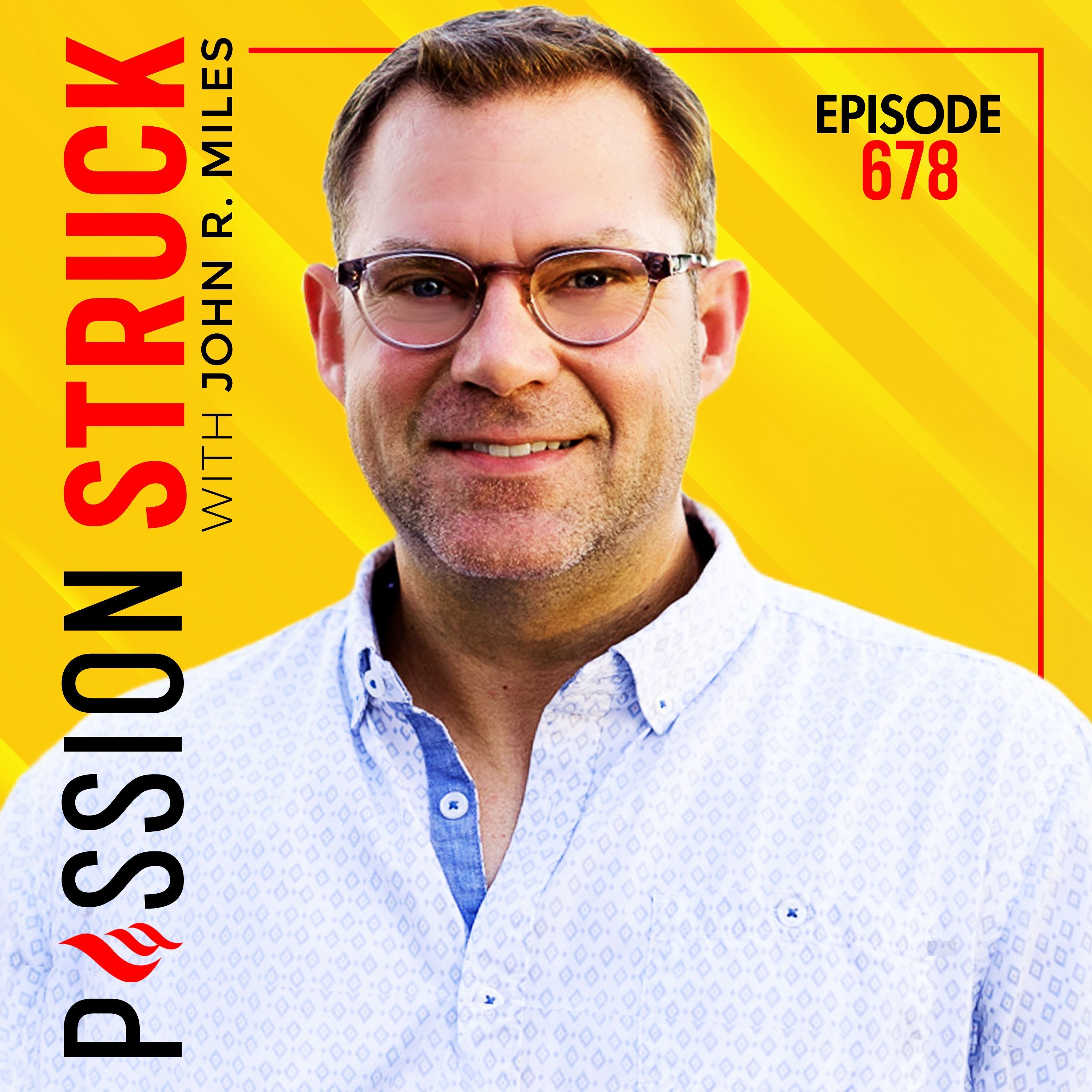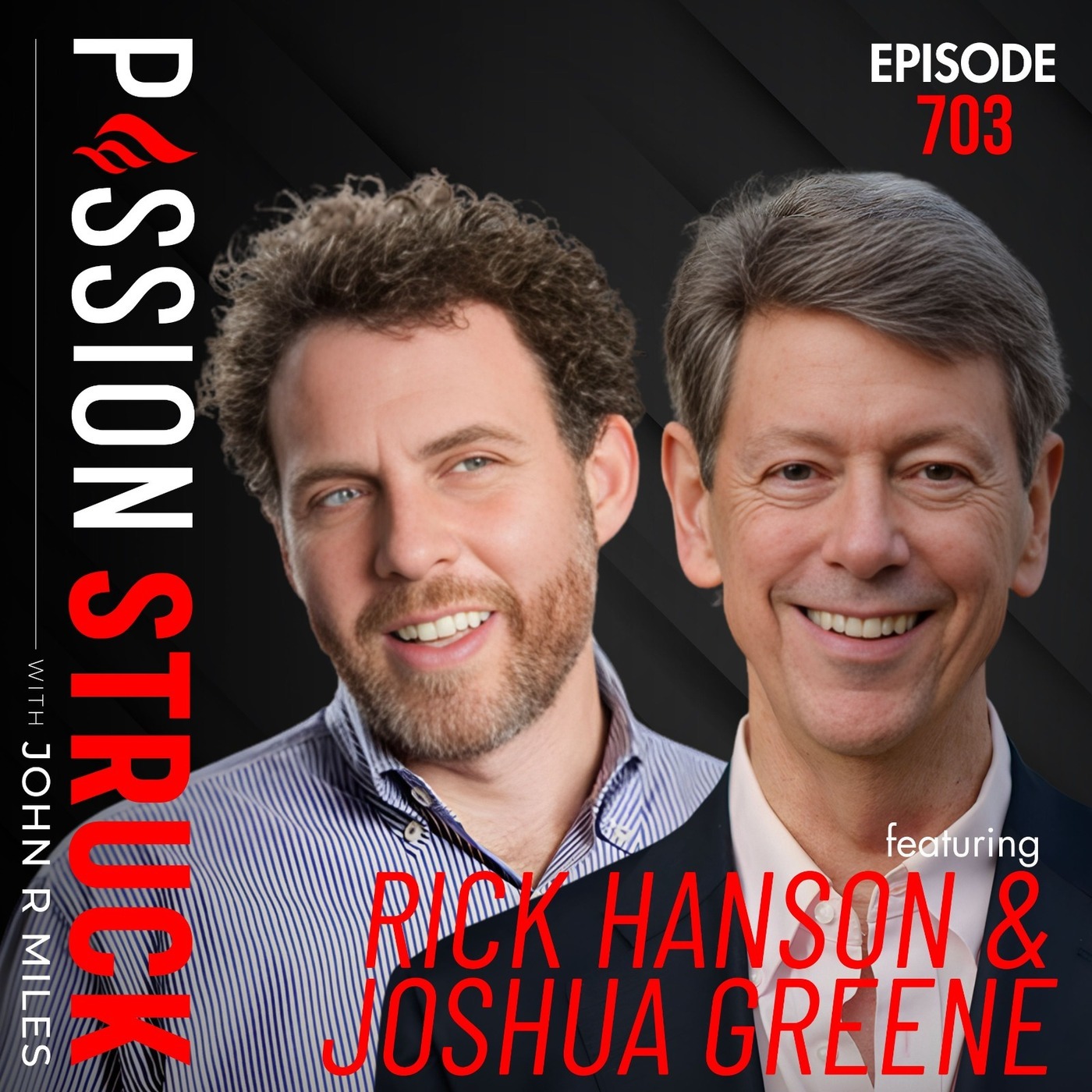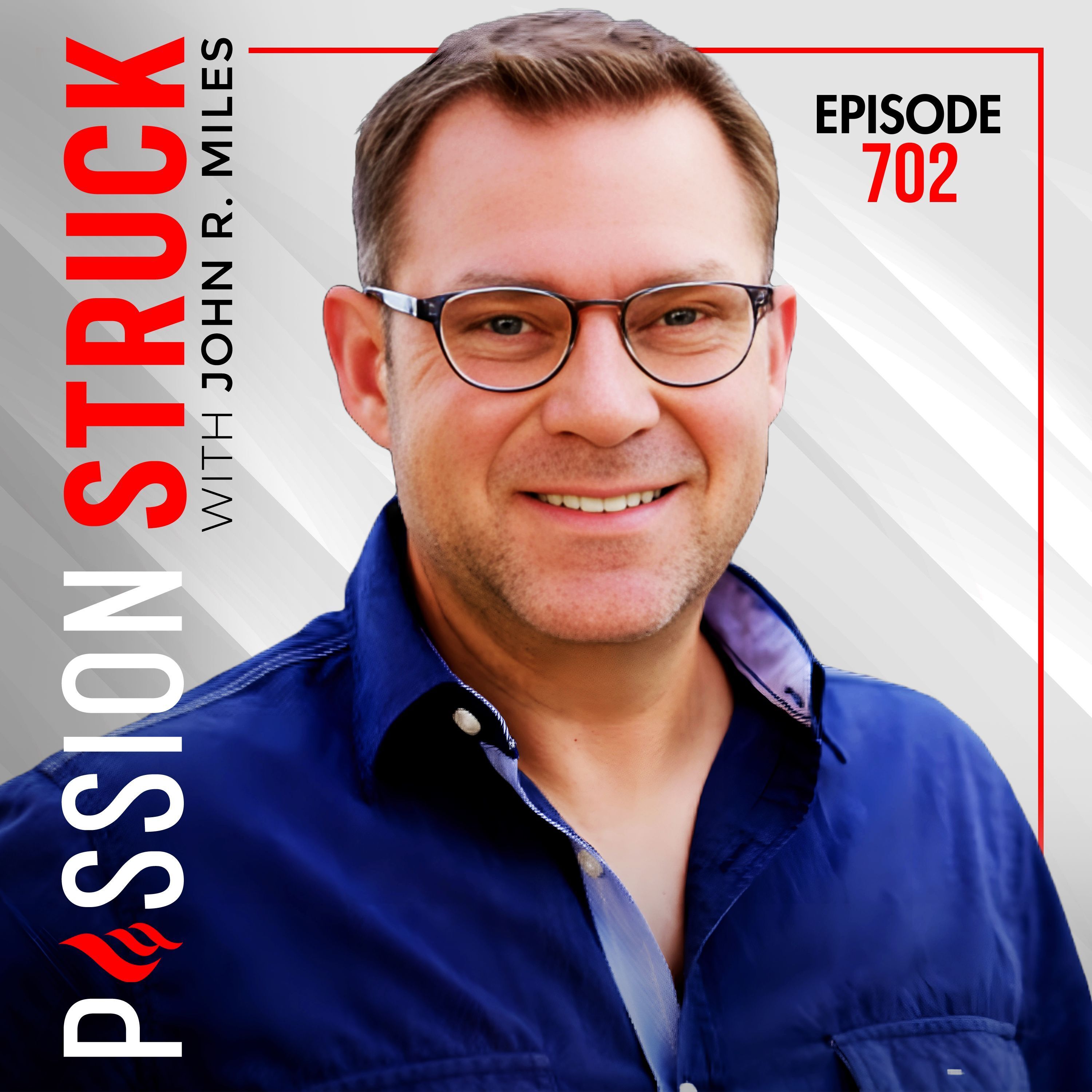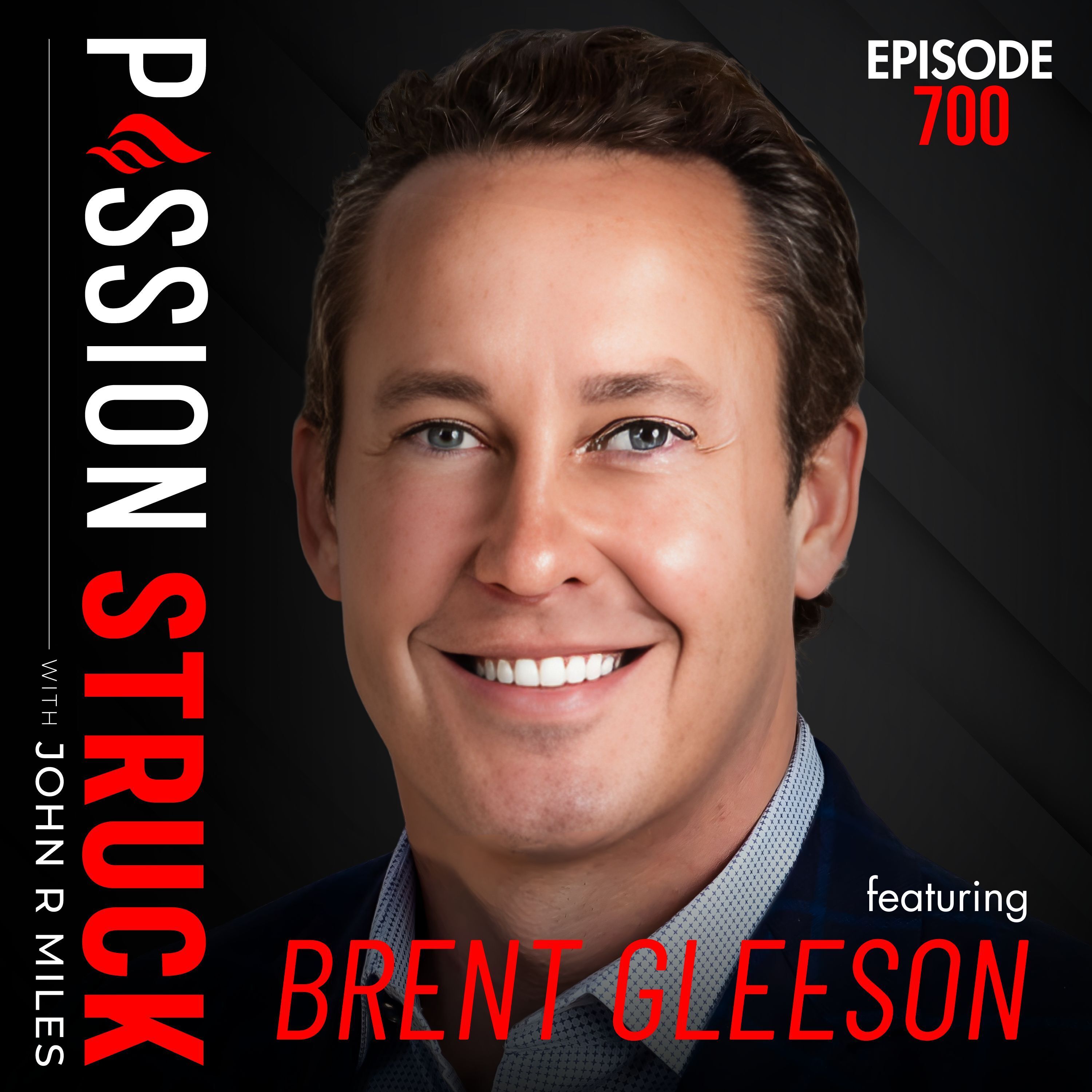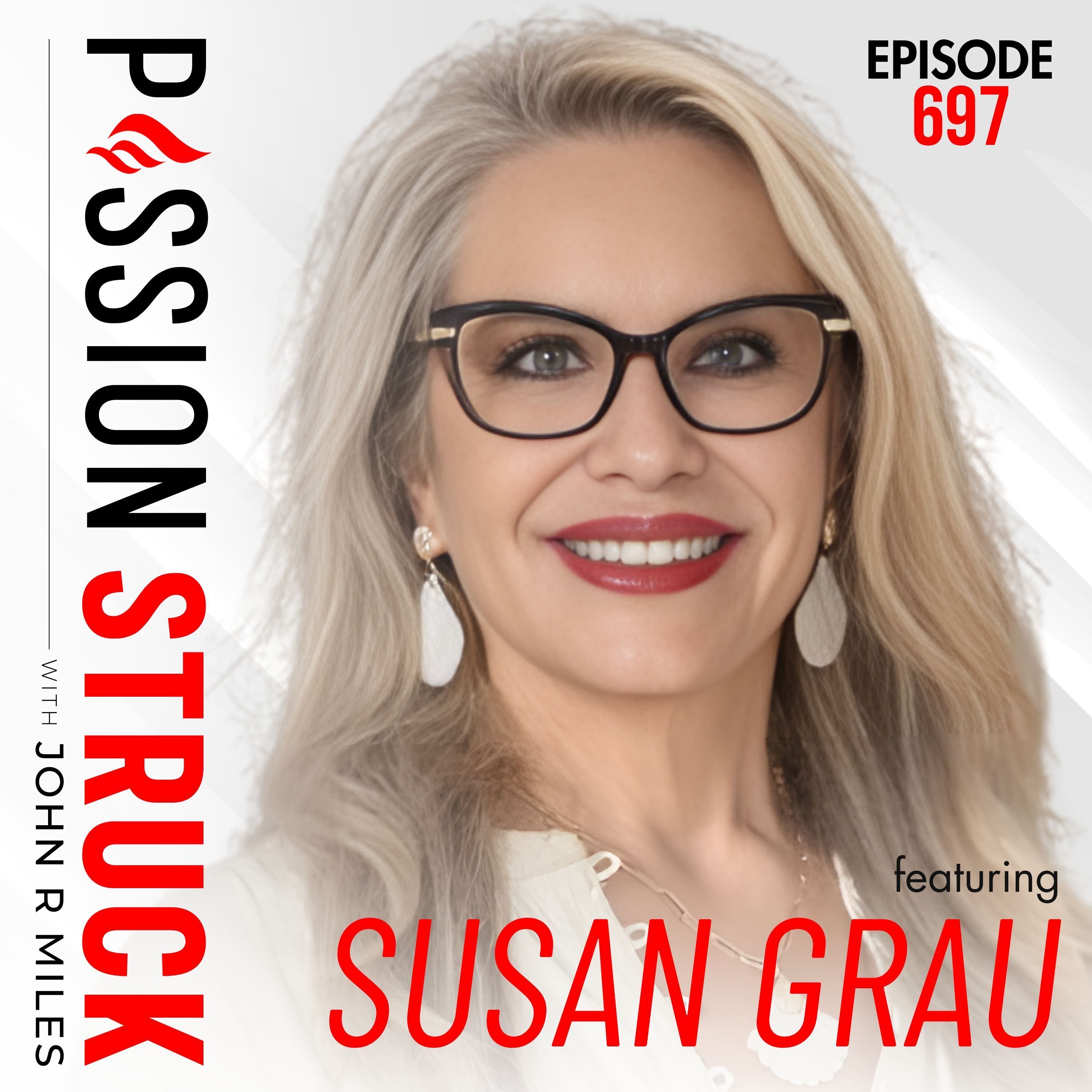The Hidden Rules of Luck: How to Design Your Own Breaks w/John R. Miles | EP 678
What if luck isn’t a matter of chance—but a hidden design you can learn to navigate?
In this episode of Passion Struck, John R. Miles explores how some people seem to “always be in the right place at the right time” — not because they’re blessed by fate, but because they’ve learned to read the invisible rulebook of luck.
Drawing on the groundbreaking work of bestselling author Amy Leigh Mercree and economist Judd Kessler, co-author of Lucky by Design, John unpacks how hidden systems, intuitive sensing, and strategic choices shape opportunities long before they appear.
You’ll learn:
- How “luck” hides in invisible structures—and how to map them
- Why intuition is less woo-woo and more Wi-Fi, helping you detect signals others miss
- The power of “settling for silver” as a strategic advantage, not a compromise
- Practical tools to design your own luck through intentional moves
Along the way, John shares a personal story of overcoming early adversity that shaped his ability to sense and design opportunities differently. Whether you’re navigating your career, relationships, or life’s next chapter, this episode will give you a new lens for understanding how luck works—and how to work with it.
Check out the Full show notes
Preorder John's new Children's Book, You Matter, Luma: https://youmatterluma.com/
Go Deeper: The Ignited Life Substack
If this episode stirred something in you, The Ignited Life is where the transformation continues. Each week, John shares behind-the-scenes insights, deeper dives into the episodes, workbooks, science-backed tools, and personal reflections to help you turn intention into action.
Get the full companion workbook at TheIgnitedLife.net
Full episode on YouTube: https://www.youtube.com/@JohnRMiles
Listen on Apple Podcasts, Spotify, or wherever you get your podcasts
Everyone deserves to feel valued and important. Show it by wearing it: https://startmattering.com/
See Privacy Policy at https://art19.com/privacy and California Privacy Notice at https://art19.com/privacy#do-not-sell-my-info.
Press play and read along
Transcript
Speaker 1 We're spending more than ever.
Speaker 2 I hate my job.
Speaker 3 The price of everything has gone up.
Speaker 1 AI is threatening my job.
Speaker 3
It's crisis after crisis. Nothing is working out.
I can't find a new one disaster.
Speaker 5 Take control of change.
Speaker 6 I need change.
Speaker 2 Disruption is the force of change.
Speaker 5 Stop the chaos.
Speaker 2 Stop the madness.
Speaker 5 Take control.
Speaker 2 Read James Patterson's Disrupt Everything and win.
Speaker 1 Free audio post-production
Speaker 7
by Alphonic.com Coming up next, I'm passion struck. Imagine being four years old.
You're watching your older siblings make strange hand gestures at each other, rock, paper, scissors.
Speaker 7
Over who gets the TV remote. One smiles, the other groans.
To you, It looks like magic, pure chance. But then someone teaches you the rules.
Speaker 7 Suddenly, what looked like luck becomes a system you can understand. And once you understand the system, you can play the game differently.
Speaker 7 As kids, we all learn the rules to games like rock, paper, scissors. But the real game, it's learning to spot the invisible rules shaping your life and then daring to play differently.
Speaker 1 That's where today's conversation begins.
Speaker 8
Welcome to Passion Struck. I'm your host, John Miles.
This is the show where we explore the art of human flourishing and what it truly means to live like it matters.
Speaker 8 Each week I sit down with change makers, creators, scientists, and everyday heroes to decode the human experience and uncover the tools that help us lead with meaning, heal what hurts, and pursue the fullest expression of who we're capable of becoming.
Speaker 8 Whether you're designing your future, developing as a leader, or seeking deeper alignment in your life, this show is your invitation to grow with purpose purpose and act with intention.
Speaker 8 Because the secret to a life of deep purpose, connection, and impact is choosing to live like you matter.
Speaker 1 Hey friends, episode 678 of Passion Struck is here and I am so glad you've joined us. To everyone who comes back week after week, thank you.
Speaker 1 You're not just supporting a show, you're fueling a movement to create a world where people feel seen, valued, and like they truly matter.
Speaker 1 And today, I'm humbled to share something incredibly personal.
Speaker 7 When a child asks, do I matter?
Speaker 1
The answer should never be silence. Yet, too many kids are growing up, believing they aren't enough.
It's heartbreaking. Nearly 42% of high school students report feeling persistently sad or hopeless.
Speaker 1 That's not just a number. That's millions of children carrying invisible weight.
Speaker 7 And here's the truth.
Speaker 1
By the time they reach middle school, it's often too late to catch the ripple. I know this personally.
When I was five years old, I suffered a traumatic brain injury that changed everything overnight.
Speaker 1 It left me with sensory and auditory processing issues, chronic migraines, ampleopia in my right eye, a severe speech impediment, words got stuck on their way out. Sounds collided in my ears.
Speaker 1 My vision blurred on one side. I felt like I was living slightly out of sync with the world around me, like everyone else was tuned to FM, and I was stuck picking up static on AM.
Speaker 1
Each week, I left my classroom for speech therapy. I remember the feeling of those moments vividly.
The classroom door would close behind me, and suddenly all eyes were on my back.
Speaker 1 My classmates would pause their work and watched as I walked alone across the wide open field that separated the classroom from the speech therapist's office.
Speaker 1 I wore an eyepatch that caught the sunlight like a beacon, broadcasting my difference to anyone who cared to look. I didn't have to hear the teasing to feel it.
Speaker 1 It lived in the smirks, in the exchange glances, in the quiet undercurrent that followed me as I crossed that field. I felt exposed, different, alone.
Speaker 1
But when I opened the door to her small sunlit room, everything changed. She greeted me with a warmth that made the noise of the outside world fade.
Her voice was steady, her presence unhurried.
Speaker 1 She had a sticker book, simple, with gold stars and cartoon animals, that became our shared ritual.
Speaker 1 Every time I pushed through a difficult word, she handed me the book with a smile that said, you did it!
Speaker 1
She didn't make me feel broken. She made me feel safe.
She made me feel like my voice mattered even when the words came out crooked.
Speaker 1 Week by week in that little room, she taught me something no one else had, that I had a choice.
Speaker 1
I could accept the limitations that injury had placed on me, or I could learn to navigate and overcome them. She helped me feel comfortable in my own skin.
Eye patch, migraine, stumbles, and all.
Speaker 1
For the first time, I felt whole. But here's the thing.
Not every child gets that moment. Too many children today are still crossing their own invisible fields, carrying quiet doubts.
Speaker 1
feeling like they don't matter. And when parents have grown up with the same unhealed sense of invisibility, it doesn't just disappear.
It gets passed down.
Speaker 1 Unworthiness ripples through generations until someone interrupts it. That's why this memory has stayed with me my entire life.
Speaker 1 And it's why I wrote You Matter Luma, a new children's book launching February 24th, 2026. It's more than a story.
Speaker 1 It's a tool grounded in behavioral science, positive psychology, and mindfulness to give children an early foundation on belonging, resilience, and self-worth.
Speaker 1 It's also the first step into something bigger that I call the Matteringverse, a storytelling universe designed to help children and the adults who guide them build the inner scaffolding of mattering.
Speaker 1 Like Pixar for the Soul, it blends wonder, storytelling, and science to make mattering a lived experience, not a forgotten lesson.
Speaker 1 If you're a parent, educator, or simply someone who believes every child deserves to feel seen and valued, I'd love for you to join me in sparking this ripple.
Speaker 1 You can pre-order You Matter Luma today at Barnes ⁇ Noble and help raise a generation who knows they matter. Links will be in the show notes.
Speaker 1
Because at its heart, You Matter Luma is about something we all crave. To feel seen, valued, and part of a larger story.
And in many ways, that's exactly what this series is about.
Speaker 1 Over the next few weeks on Passion Struck, we're exploring the forces that shape us, the invisible currents that pull at our attention, shape our decisions, and quietly determine the lives we build.
Speaker 1 Last week, we began with the gravity of doubt, how doubt isn't a weakness to overcome, but a force that can pull us toward meaning if we learn how to work with it.
Speaker 1 This week, we're turning to luck and intuition, two forces that often feel mysterious, even magical. But when you look closer, you start to see the hidden structures underneath.
Speaker 1 These forces might seem invisible, but they shape the paths we walk, the doors that open, and the moments that define us.
Speaker 1 And when we learn to recognize them, work with them, and design intentionally, we stop waiting for life to happen and start shaping the field we're playing on.
Speaker 1 Thank you for choosing Passion Struck and choosing me to be your host and guide on your journey to creating an intentional life. Now, let that journey begin.
Speaker 4
Time. It's always vanishing.
The commute, the errands, the work functions, the meetings, selling your your car?
Speaker 9 Unless you sell your car with Carvana.
Speaker 4 Get a real offer in minutes.
Speaker 9 Get it picked up from your door. Get paid on the spot.
Speaker 4 So fast you'll wonder what it catches.
Speaker 6 There isn't one.
Speaker 9 We just respect you and your time. Oh, you're still here? Move along now.
Speaker 4 Enjoy your day.
Speaker 9 Sell your car today.
Speaker 9 Pickup fees may apply.
Speaker 1 I want to start today with a profound question.
Speaker 7
What if luck isn't a matter of chance, but a hidden design we can learn to navigate? We all talk about it. She just got lucky.
I wasn't in the right place at the right time.
Speaker 7 It's just not in the cards for me. But what if most of what we call luck isn't random at all?
Speaker 7 What if it's the product of invisible systems, subtle intuition, and intentional choices that shape the opportunities we attract?
Speaker 7 Yesterday, my guest, economist Judd Kessler, told me a story about sitting in an auditorium full of anxious parents in New York City. The topic? Kindergarten admissions.
Speaker 7 Dozens of families were competing for a limited number of coveted seats at the city's top schools.
Speaker 7
As officials explained the matching process, parents scribbled notes, whispered nervously, tension thick in the room. But Judd, he wasn't panicking.
He was the anomaly.
Speaker 7 He was calm because, unlike most people there, he understood the rules.
Speaker 7 Before that meeting, he had studied the algorithm the city used to assign seats, a system designed by economists to match children to schools in a way that was supposed to be fair and efficient.
Speaker 7 To most parents, the outcome of that system felt like a lottery. To Judd, it was a hidden market, a structure with rules, incentives, and levers that once understood, could tilt the odds.
Speaker 7 What looked like luck, to everyone else was, to him, something you could design for. That moment planted the seed for Judd's research that many of life's lucky outcomes aren't accidents at all.
Speaker 7
They're the product of systems we can learn to navigate if only we can see them. And that's where we begin today.
Because luck isn't just a force that acts on us. It's a landscape.
Speaker 7
And once you understand the terrain, you can start to move through it with greater clarity. and intention.
Luck often hides in plain sight, but before we can name the hidden rules, we often feel them.
Speaker 7 That's where intuition comes in. For a lot of people, intuition sounds like something mystical, a gut feeling, a sixth sense, something you either have or you don't.
Speaker 7 But as Amy Lee McCree explained to me earlier this week, intuition is far more than that. Amy blends particle physics with spirituality to describe intuition through the lens of energy.
Speaker 7 She explains that what many traditions call the aura isn't just a metaphor. It's a biologically generated electromagnetic field made of photons.
Speaker 7 Each one of us is constantly emitting and receiving subtle energetic signals. It's happening whether we're aware of it or not.
Speaker 7 And our intuition is the sensing mechanism, picking up on information long before our rational mind can catch up. For me, this isn't rhetorical.
Speaker 7 When I was 24, I experienced another traumatic brain injury, and it changed how I processed the world. Alongside the speech and vision challenges, I began noticing something unusual.
Speaker 7 I could sense people's moods, attention, and even their intentions before they said a word. At first, I didn't have a language for it.
Speaker 7 It felt like stepping into a room and just knowing something had shifted in the air. Over time, I learned to trust it.
Speaker 7 Years later, in my corporate life, this intuitive sense became one of my greatest assets. I remember walking into a high-stakes board of directors pitch, millions of dollars on the line.
Speaker 7 As the presentation unfolded, something in me shifted. I sensed that the energy in the room had tightened, even though no one had said anything.
Speaker 7
I pivoted mid-pitch, changed the story I was telling, and addressed the unspoken concerns I felt in the room. Afterwards, one of the executives told me, John, it's like you read our minds.
I hadn't.
Speaker 7
I just listened to my intuition. This is where intuition and luck intersect.
Often, intuition is how we sense the hidden rules in real time, before we can articulate them logically.
Speaker 7 It's like having a radar for invisible structures. Doubt pulls us inward, making us question.
Speaker 7
Intuition pulls us outward, helping us detect. Doubt pulls us inward.
Intuition pulls us outward.
Speaker 7 And when we pair that sensing ability with an understanding of the systems around us, we stop stumbling into luck accidentally and start navigating it intentionally.
Speaker 7 I hope you're enjoying today's episode.
Speaker 1
Here are two quick ways to support the show and go deeper. First, you can access the companion workbook for today's episode.
It's available exclusively on our sub stack at theignitedlife.net.
Speaker 1 It's designed to help you map the forces of luck and intuition in your own life. and put these ideas into practice.
Speaker 1 Second, if this episode is resonating with you, share it with someone who could benefit. Or just take a few seconds to leave a five-star rating or review on Apple Podcasts or Spotify.
Speaker 1
It's one of the most powerful ways to help new listeners discover the show and grow this movement. Now, a short break for our sponsors.
Thank you for supporting those who support the show.
Speaker 10 Are you ready to take your small biz to the next level? At the UPS store, we have the key to unlock a world of possibilities. We'll sign for your packages and protect them from porch pirates.
Speaker 10 We'll send texts straight to your phone so you're in the loop for new deliveries and give your small biz the street credit deserves with a real street address. So what are you waiting for?
Speaker 10
Most locations are independently owned. Product services, pricing, and hours of operation may vary.
See Center for Details, the UPS store. Be unstoppable.
Come into your local store today.
Speaker 1 You're listening to Passion Struck on the Passion Struck Network.
Speaker 7 So far, we've explored luck. as a hidden design, structures that shape outcomes whether we see them or not.
Speaker 7 And we've explored intuition is the internal radar that helps us sense those structures in real time. But sensing and understanding are only half the story.
Speaker 7 The real power comes when we learn how to design intentionally, when we stop waiting for luck to happen and start aligning ourselves with the forces that shape our lives.
Speaker 7 This is where Judd Kessler's work becomes incredibly useful. Judd has spent years studying these hidden landscapes, what he calls hidden markets.
Speaker 7 These are the invisible systems that quietly decide who gets what opportunities. And if we can learn to read the map, we can stop wandering and start navigating intentionally.
Speaker 7
The first thing I learned from Judd is that hidden markets don't emerge randomly. They're designed around three principles, equity, efficiency, and ease.
You can think of it like this. Equity.
Speaker 7
How fair is the system in distributing opportunities? Efficiency. How well does it allocate resources to create the best outcomes? Ease.
How simple is it for people to understand and participate?
Speaker 7 Most people never think about these forces. They just walk whatever path is in front of them and call it luck.
Speaker 7 But if you pause, step back, and look at the map, you'll start to see why certain doors open for some and not for others. Understanding these forces is like zooming out and finally seeing the terrain.
Speaker 7 When we learn to see these forces at play in organizations, in relationships, in industries, we start to identify where luck tends to concentrate and more importantly, where small changes in how we show up can shift our position within that landscape.
Speaker 7 Let's make this real for a moment. Think about something as simple and high stakes as the college admission process.
Speaker 7 On the surface, it looks like a game of merit and luck, but underneath, it's a carefully designed hidden market, one shaped by equity, efficiency, and ease.
Speaker 7 Equity decides who gets access to the game in the first place. Who has counselors, test prep, legacy status, or financial aid?
Speaker 7 Efficiency determines how the system tries to match students to schools through algorithms, rankings, and yield calculations. Ease? That's how navigable the process is for families.
Speaker 7
Some know exactly which levers to pull. Others get lost in the maze.
To one student, the outcome feels like pure luck. To another, it feels like strategy.
The rules didn't change.
Speaker 7
Their visibility into those rules did. And that's the key insight here.
When you can see the map, you stop calling everything luck. You start making intentional moves.
Speaker 7
This applies to far more than college admissions. It shows up in hiring processes, dating apps.
startup fundraising, publishing, even the way opportunities circulate in your local community.
Speaker 7 If you understand the principles shaping the terrain, equity, efficiency, and ease, you can position yourself differently within it.
Speaker 7 And sometimes positioning yourself differently means not always aiming for the obvious best spot on the map.
Speaker 7 That's where Judd's idea of settling for silver comes in, and it's one of the most counterintuitive yet powerful strategies for designing luck. on your terms.
Speaker 7 Most of us are taught from a young age to chase gold, the perfect job, the Ivy League school, the dream scenario. And of course, that's exactly what everyone else is chasing too.
Speaker 7 The path becomes jammed with competitions and expectations and friction. It's like trying to merge onto a packed freeway during rush hour, everyone gunning for the same lane, no one moving quickly.
Speaker 7 But just off to the side, there's often a silver path, less crowded, more strategic, and in many cases, just as meaningful. It's like choosing the scenic backroad over the clogged highway.
Speaker 7 You can still reach your destination, sometimes faster, and with far less noise. I experienced this firsthand with my children's book, You Matter Luma.
Speaker 7 For over a year, I chased the traditional gold route, the major publishers, the big imprints, and over and over again, I got turned down. Each rejection made the dream feel farther away.
Speaker 7 Eventually, I started to look beyond the narrow lane. That's when I found Morgan James Publishing, a publisher with a strong track record of success, including children's books.
Speaker 7 It wasn't the big gold-plated imprint I thought I needed, but it turned out to be exactly the silver path that unlocked the door.
Speaker 7
The book is now on its way into the world, and I couldn't be more excited. So, think about your own life for a moment.
Where are you charging toward gold?
Speaker 7 when a silver path might actually serve you better. Sometimes, the smartest design move isn't to push harder against the front door.
Speaker 7
It's to quietly walk through the side door no one else is looking at. Because in the game of intentional design, silver isn't a setting.
It's strategy.
Speaker 7 When you step back and look at these ideas, the hidden maps behind luck, the radar of intuition, and the strategic detours like the silver path, a pattern starts to emerge.
Speaker 7 These aren't random moments.
Speaker 7 They're part of a larger art of intentional design, a way of moving through the world where you stop waiting for chance to choose you and instead learn to navigate the forces shaping your path.
Speaker 7
And that brings us to the key insight I want to leave with you today. Designing your life isn't about controlling everything.
You can't, but you can learn to understand the rules.
Speaker 7
sense the invisible forces around you, and make strategic, intentional moves within that landscape. That's where luck, intuition, and design intersect.
Luck shapes the field.
Speaker 7
Intuition shows you where to look. Design is how you move through it.
So thus far, we've explored how luck often hides inside invisible systems.
Speaker 7 We've seen how intuition acts like a radar for sensing those structures in real time.
Speaker 7
And we've learned that sometimes the smartest move is to take the silver path rather than battling it out for gold. But knowledge alone doesn't change anything.
Application does.
Speaker 7
So here are three practical ways you can start designing your luck this week. First, map the hidden market.
Think about one area of your life where luck seems to determine everything.
Speaker 7 Maybe it's landing clients, getting promoted, breaking into a new industry, or finding the right community. Pause and ask, what rules are actually at play here? Then ask, who are the gatekeepers?
Speaker 7 And lastly, what patterns or systems might I be missing? What we call luck is often just structured we haven't learned to see yet. When you name the rules, you turn randomness into strategy.
Speaker 7
And that is something you can navigate. Second, listen for intuitive pulls.
Intuition often senses hidden variables before we can articulate them.
Speaker 7 Start paying attention to the tugs, those subtle signals where something feels off, or conversely, magnetizing. Ask yourself, what is my intuition trying to highlight here?
Speaker 7 Is there a mismatch between what I have spec and what I'm sensing? Doubt pulls us inward to question. Intuition pulls us outward to detect.
Speaker 7
Your intuition is often picking up the data your brain hasn't processed yet. Learning to trust that radar.
can change the moves you make in real time.
Speaker 7 And that brings us to number three, settle for silver strategically. Not every win happens on the crowded gold path.
Speaker 7 So ask yourself, where might a second best option actually offer a faster, smarter, or more aligned route? Then ask yourself, what side doors exist that others are overlooking?
Speaker 7
Silver isn't settling, it's strategy. The fact of the matter is the gold path is crowded.
The silver path is often where momentum lives. And then lastly, fourth, run the design loop regularly.
Speaker 7
Every few months, run a simple loop. First, map the structure.
Second, sense through intuition. Third, identify silver paths.
And four, make a small, intentional shift.
Speaker 7
Designing your luck isn't a one-time act. It's a repeatable practice.
And luck favors the designed.
Speaker 7 When you start treating luck this way, mapping the hidden markets, tuning into intuitive pulls, and strategically settling for silver, something profound happens. Luck stops being a coin toss.
Speaker 7 It becomes a landscape, one that you can see, navigate, and design around.
Speaker 7 As we wrap up today's episode, I want you to pause and reflect. Where in your life have you been waiting for luck to strike when in reality, The rules have been sitting right in front of you?
Speaker 7 Where has your intuition been whispering, but you've been too busy to listen? And where might a silver path be waiting quietly on the sidelines if you'd only stop pushing at the front door?
Speaker 7 What if luck isn't out there deciding your fate, but waiting for you to learn its design? Because at the end of the day, luck favors the designed.
Speaker 7 And speaking of unseen forces, next week, we're shifting our focus to a different kind of power. the power to defy.
Speaker 7 I'll be joined by Sunita Shah, author of Defy, The Power of of No in a World That Demands Yes.
Speaker 7 We'll explore how learning to say no with clarity and courage can reshape your life, relationships, and identity in profound ways.
Speaker 11 We are often rewarded so much for being compliant. Society doesn't just reward compliance, it teaches it in pretty much everything that we do.
Speaker 11 We're praised for going along, for keeping quiet, for not making trouble, for being a team player. All of these aspects, we get these rewards, but often they come with so many individual costs.
Speaker 11
That cost is real. We have regret, we have burnout, we have stress, we have anxiety, we have depression, we have chronic inflammation.
We have so many costs that we don't think about.
Speaker 11 We spend so much time thinking about the costs of defiance. We need to spend some time thinking about the costs of compliance.
Speaker 1 If today's episode resonated with you, here are quick ways to support the movement. Pre-order my new children's book, You Matter Luma, on Barnes ⁇ Noble.
Speaker 1 Subscribe to Passion Struck on Apple Podcasts, Spotify, or YouTube. Leave a five-star rating or review and share this episode with someone who could benefit.
Speaker 1 Until next time, tune into the forces you can't always see. Lead with intention, and as always, live life Passion Struck.
Speaker 1 Free audio post-production
Speaker 1 by Alphonic.com
Speaker 12
All right, remember, the machine knows if you're lying. First statement: Carvana will give you a real offer on your car all online.
False. True, actually.
You can sell your car in minutes.
Speaker 4 False? That's gotta be. True again.
Speaker 12 Carvana will pick up your car from your door, or you can drop it off at one of their car vending machines.
Speaker 5 Sounds too good to be true, so true.
Speaker 12
Finally, caught on. Nice job.
Honesty isn't just their policy, it's their entire model. Sell your car today, too.
Speaker 6 Carvana. Vana!
Speaker 12 Pickup fees may apply.
